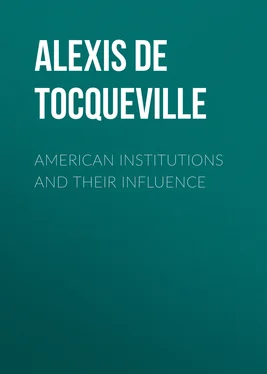Alexis de Tocqueville - American Institutions and Their Influence
Здесь есть возможность читать онлайн «Alexis de Tocqueville - American Institutions and Their Influence» — ознакомительный отрывок электронной книги совершенно бесплатно, а после прочтения отрывка купить полную версию. В некоторых случаях можно слушать аудио, скачать через торрент в формате fb2 и присутствует краткое содержание. Жанр: foreign_antique, Политика, foreign_edu, на английском языке. Описание произведения, (предисловие) а так же отзывы посетителей доступны на портале библиотеки ЛибКат.
- Название:American Institutions and Their Influence
- Автор:
- Жанр:
- Год:неизвестен
- ISBN:нет данных
- Рейтинг книги:5 / 5. Голосов: 1
-
Избранное:Добавить в избранное
- Отзывы:
-
Ваша оценка:
- 100
- 1
- 2
- 3
- 4
- 5
American Institutions and Their Influence: краткое содержание, описание и аннотация
Предлагаем к чтению аннотацию, описание, краткое содержание или предисловие (зависит от того, что написал сам автор книги «American Institutions and Their Influence»). Если вы не нашли необходимую информацию о книге — напишите в комментариях, мы постараемся отыскать её.
American Institutions and Their Influence — читать онлайн ознакомительный отрывок
Ниже представлен текст книги, разбитый по страницам. Система сохранения места последней прочитанной страницы, позволяет с удобством читать онлайн бесплатно книгу «American Institutions and Their Influence», без необходимости каждый раз заново искать на чём Вы остановились. Поставьте закладку, и сможете в любой момент перейти на страницу, на которой закончили чтение.
Интервал:
Закладка:
His views of religion, as connected with patriotism, in other words, with the democratic principle, which he steadily keeps in view, are conceived in the noblest spirit of philanthropy, and cannot fail to confirm the principles already so thoroughly and universally entertained by the American people. And no one can read his observations on the union of "church and state," without a feeling of deep gratitude to the founders of our government, for saving us from such a prolific source of evil.
These allusions to topics that have interested the writer, are not intended as an enumeration of the various subjects which will arrest the attention of the American reader. They have been mentioned rather with a view of exciting an appetite for the whole feast, than as exhibiting the choice dainties which cover the board.
It remains only to observe, that in this edition the constitutions of the United States and of the state of New York, which had been published at large in the original and in the English edition, have been omitted, as they are documents to which every American reader has access. The map which the author annexed to his work, and which has been hitherto omitted, is now for the first time inserted in the American edition, to which has been added the census of 1840.
INTRODUCTION
Among the novel objects that attracted my attention during my stay in the United States, nothing struck me more forcibly than the general equality of conditions. I readily discovered the prodigious influence which this primary fact exercises on the whole course of society, by giving a certain direction to public opinion, and a certain tenor to the laws; by imparting new maxims to the governing powers, and peculiar habits to the governed.
I speedily perceived that the influence of this fact extends far beyond the political character and the laws of the country, and that it has no less empire over civil society than over the government; it creates opinions, engenders sentiments, the ordinary practices of life, and modifies whatever it does not produce.
The more I advanced in the study of American society, the more I perceived that the equality of conditions is the fundamental fact from which all others seem to be derived, and the central point at which all my observations constantly terminated.
I then turned my thoughts to our own hemisphere, where I imagined that I discerned something analogous to the spectacle which the New World presented to me. I observed that the equality of conditions is daily advancing towards those extreme limits which it seems to have reached in the United States; and that the democracy which governs the American communities, appears to be rapidly rising into power in Europe.
I hence conceived the idea of the book which is now before the reader.
It is evident to all alike that a great democratic revolution is going on among us; but there are two opinions as to its nature and consequences. To some it appears to be a novel accident, which as such may still be checked; to others it seems irresistible, because it is the most uniform, the most ancient, and the most permanent tendency which is to be found in history.
Let us recollect the situation of France seven hundred years ago, when the territory was divided among a small number of families, who were the owners of the soil and the rulers of the inhabitants; the right of governing descended with the family inheritance from generation to generation; force was the only means by which man could act on man; and landed property was the sole source of power.
Soon, however, the political power of the clergy was founded, and began to exert itself; the clergy opened its ranks to all classes, to the poor and the rich, the villain and the lord; equality penetrated into the government through the church, and the being who, as a serf, must have vegetated in perpetual bondage, took his place as a priest in the midst of nobles, and not unfrequently above the heads of kings.
The different relations of men became more complicated and more numerous, as society gradually became more stable and more civilized. Thence the want of civil laws was felt; and the order of legal functionaries soon rose from the obscurity of the tribunals and their dusty chambers, to appear at the court of the monarch, by the side of the feudal barons in their ermine and their mail.
While the kings were ruining themselves by their great enterprises, and the nobles exhausting their resources by private wars, the lower orders were enriching themselves by commerce. The influence of money began to be perceptible in state affairs. The transactions of business opened a new road to power, and the financier rose to a station of political influence in which he was at once flattered and despised.
Gradually the spread of mental acquirements, and the increasing taste for literature and art, opened chances of success to talent; science became the means of government, intelligence led to social power, and the man of letters took a part in the affairs of the state.
The value attached to the privileges of birth, decreased in the exact proportion in which new paths were struck out to advancement. In the eleventh century nobility was beyond all price; in the thirteenth it might be purchased; it was conferred for the first time in 1270; and equality was thus introduced into the government by the aristocracy itself.
In the course of these seven hundred years, it sometimes happened that, in order to resist the authority of the crown, or to diminish the power of their rivals, the nobles granted a certain share of political rights to the people. Or, more frequently the king permitted the lower orders to enjoy a degree of power, with the intention of repressing the aristocracy.
In France the kings have always been the most active and the most constant of levellers. When they were strong and ambitious, they spared no pains to raise the people to the level of the nobles; when they were temperate or weak, they allowed the people to rise above themselves. Some assisted the democracy by their talents, others by their vices. Louis XI. and Louis XIV. reduced every rank beneath the throne to the same subjection; Louis XV. descended, himself and all his court, into the dust.
As soon as land was held on any other than a feudal tenure, and personal property began in its turn to confer influence and power, every improvement which was introduced in commerce or manufacture, was a fresh element of the equality of conditions. Henceforward every new discovery, every new want which it engendered, and every new desire which craved satisfaction, was a step toward the universal level. The taste for luxury, the love of war, the sway of fashion, the most superficial, as well as the deepest passions of the human heart, co-operated to enrich the poor and to impoverish the rich.
From the time when the exercise of the intellect became the source of strength and of wealth, it is impossible not to consider every addition to science, every fresh truth, and every new idea, as a germe of power placed within the reach of the people. Poetry, eloquence, and memory, the grace of wit, the glow of imagination, the depth of thought, and all the gifts which are bestowed by Providence with an equal hand, turned to the advantage of the democracy; and even when they were in the possession of its adversaries, they still served its cause by throwing into relief the natural greatness of man; its conquests spread, therefore, with those of civilisation and knowledge; and literature became an arsenal, where the poorest and weakest could always find weapons to their hand.
In perusing the pages of our history, we shall scarcely meet with a single great event, in the lapse of seven hundred years, which has not turned to the advantage of equality.
The crusades and the wars of the English decimated the nobles, and divided their possessions; the erection of communes introduced an element of democratic liberty into the bosom of feudal monarchy; the invention of firearms equalized the villain and the noble on the field of battle; printing opened the same resources to the minds of all classes; the post was organized so as to bring the same information to the door of the poor man's cottage and to the gate of the palace; and protestantism proclaimed that all men are alike able to find the road to heaven. The discovery of America offered a thousand new paths to fortune, and placed riches and power within the reach of the adventurous and the obscure.
Читать дальшеИнтервал:
Закладка:
Похожие книги на «American Institutions and Their Influence»
Представляем Вашему вниманию похожие книги на «American Institutions and Their Influence» списком для выбора. Мы отобрали схожую по названию и смыслу литературу в надежде предоставить читателям больше вариантов отыскать новые, интересные, ещё непрочитанные произведения.
Обсуждение, отзывы о книге «American Institutions and Their Influence» и просто собственные мнения читателей. Оставьте ваши комментарии, напишите, что Вы думаете о произведении, его смысле или главных героях. Укажите что конкретно понравилось, а что нет, и почему Вы так считаете.












